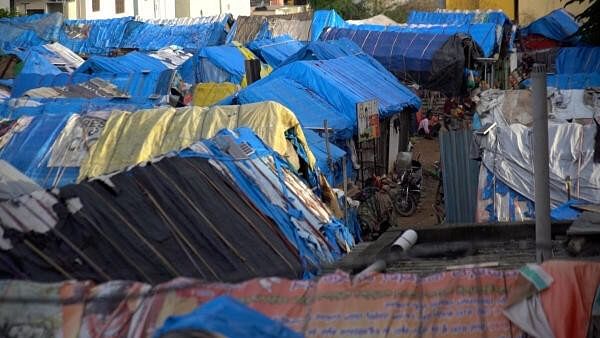
Bengaluru's slums.
Credit: DH Photo
Bengaluru: The Karnataka government is set to commission yet another multi-crore project from Wednesday to bring 775 mld water from Cauvery river, but not much is expected to change for the 15 lakh people residing in the slums of the city.
Bengaluru city is home to 21 per cent of the 2,804 slums in Karnataka, as per the Karnataka Slum Development Board (KSDB). Of the 597 slums in Bengaluru city, 435 have been recognised while the remaining are not even documented.
The increasing GDP of the city has led to rise in the number of slums in the last 30 years. “Inequality and agrarian crisis brought more poor to Bengaluru. As the city got richer, we have observed slum dwellers being evicted from core areas. The few slums that were rehabilitated are now located in the forgotten corners of the BBMP map where water, sanitation and electricity is a luxury,” said Isaac Arul Selva, the editor of Slum Jagattu, a magazine that has documented the displacements.
Balaraju N P, KSDB Chief Engineer, said the Board has not lost time in “declaring” the slums. “Of the 435 slums for which records were prepared, 413 have been declared as recognised slums. This will facilitate access to water and sanitation,” he said.
A senior KAS officer who served as the KSDB commissioner said the board has been left to fend for itself in many cases. “About 80 per cent of the 435 declared (officially recognised) slums are dependent on borewell water. We don’t have sufficient funds to pay the charges fixed by the BWSSB. The Board is somehow providing water through public taps free of cost but it is insufficient. In some cases, they have given individual connections but we keep getting complaints about inadequate supply,” he said.
An assessment of the water equity in low income communities in Bengaluru in April 2023 by Environmental Synergies in Development and Biome Environmental Trust says the pro-poor water policy of the Bengaluru Water Supply and Sewerage Board is “riddled with newer” issues along with some old ones.
The study said the survival of people in the harsh and unforgiving environment of slums shows resilience of a different magnitude. “The BWSSB’s pro-poor policy in 2000 was successful at so many levels, especially in their intent to provide cheap piped water supply. With the new 2050 vision of BWSSB, which does not mention the urban poor at all, it is not clear how water supply to these lower income communities would change,” it said.
To a question, BWSSB Chairman Ram Prasath Manohar said the Board has continued its pro-poor policy. “We are supplying 10,000 litre of Cauvery water per individual house free of cost. Those who have not taken the BWSSB connection can apply directly or send request through the KSDB. Meanwhile, we are supplying borewell water free of cost,” he said.
Swabhimaan Trust’s Venakataraman Iyer, who has worked for community development in three slums - Rajendranagar, LR Nagar and Neelasandra - for over 20 years, said water security was a pipe dream in slums.
“The quality of the water is poor due to frequent sewage contamination. The quantity is very low. Households get two-hour water supply after 10 pm. That means, women keep awake beyond 12 am. These are daily wagers who have to get up, cook for the family and run to work early in the morning,” he said.
Iyer said many households could not afford to pay BWSSB water bills.
“Their wages have remained stagnant but rising cost of food, LPG and essential materials has made the idea of paying for water anathema,” he said, pointing to growing poverty post-Covid pandemic.